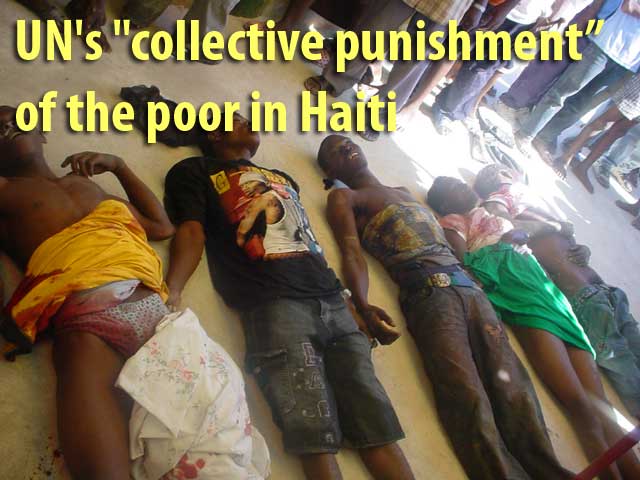|
UN's "collective punishment" of the poor in Haiti
January 30, 2007
|
News
HaitiAction.net
|
||||
 |
 |
 |
 |
 |
 |
 |
| Photos: ©2006 Haiti Information Project video footage by HIP shows the actual testimony — as they lay dying — from three of the victims of the UN massacre of December 22, 2006 |
UN's "collective punishment" of the poor in Haiti
(HIP - Oakland, CA, USA) As residents of the Haitian seaside shanty town of Cite Soleil continue to reel from a deadly UN military operation this last December, fears of new forms of collective punishment are rising as the community's only source of running water is destroyed. Almost weekly and sometimes daily military assaults on Cite Soleil have severely damaged the public water system as stray gunfire from UN forces has punctured pipelines and, most recently, a large water tower which sits above the sprawling community of cardboard and cinderblock shacks covered by tin roofs.
Residents in Cite Soleil are now being forced to walk several kilometers with heavy plastic buckets to obtain water. Large water trucks are allowed to deliver water by UN forces. They then sell it to private speculators and vendors but most of Cite Soleil's 500,000 residents cannot afford to buy it.
According to the Director of the Institute for Justice and Democracy in Haiti, Brian Concannon, "This is beginning to resemble collective punishment against the residents of Cite Soleil. There is more to this than just the issue of gangs and alleged kidnappers." Concannon continued, "If this were just about gangs then why isn't the UN going after the Little Machete Army in Martissant?" That para-military group massacred spectators at a soccer game in broad daylight down the street from a UN observation post in August 2005, hacking its victims to death with machetes. The group attacked another neighborhood last summer, and according to media reports it assassinated community leader Esterne Bruner last September 21, and freelance photojournalist Jean-Remy Badio on January 19.
All along, Martissant residents had been asking the UN to provide protection. The Little Machete Army still controls the area through terror and intimidation despite the presence of United Nations forces.
To further illustrate his point Concannon points to other gangs in Haiti, "Gangs that were members of the Gonaives Resistance Front took over the police station in Haiti's fourth largest city, Gonaives, in February 2004. They have never disarmed, and some of the gangs, especially those led by Wilfort Ferdinand and Winter Etienne, regularly and openly control large parts of the city to this day. But there are no large-scale assaults to dislodge them. It is hard not to see the connection between the large-scale protests in Cite Soleil, and that neighborhoods being singled out for major military operations."
On December 16, 2006, there was a massive demonstration of over ten thousand people demanding the return of ousted president Aristide and freedom for political prisoners. The protest was launched from Cite Soleil. Six days later on December 22, UN forces launched another major military assault on Cite Soleil that residents claim killed about 30 people and wounded many others including a woman who was six months pregnant. She claims she was shot by a UN armored vehicle in the abdomen instantly killing her sixth-month unborn child.
See Also:
|
Accusations of UN cover up in Haiti Feb 2 Haiti: Revelations of UN's role in massacres US Embassy in Haiti acknowledges excessive force by UN Jan23 A Call to Action: Join the International Day in Solidarity with the People of Haiti! Coordinated International Protests on February 7, 2007 |

|
